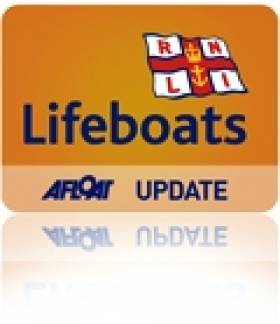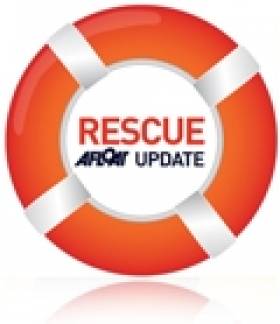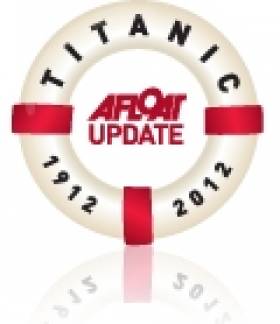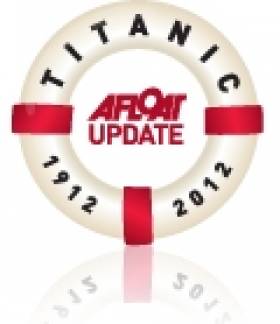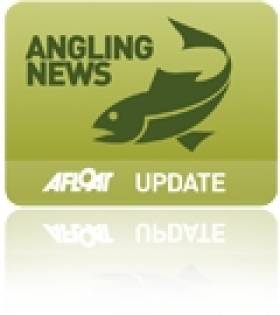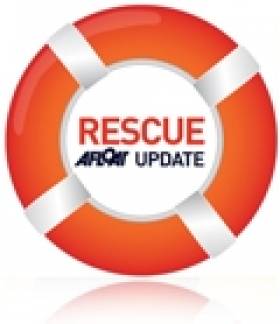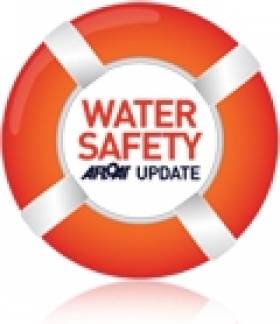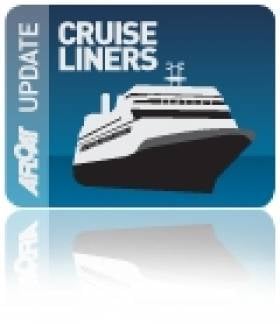Displaying items by tag: Rescue
Irish Sailor Missing After San Francisco Yacht Hits Rocks
#SAN FRANCISCO MISSING SAILORS – An Irish sailor is reported missing from a yacht in San Francison after a serious accident during a yacht race at the weekend.
One crew man died, three others are missing and three survived after 12-foot waves hit James Bradford's Sydney 38 Low Speed Chase, which was competing in the Full Crew Farallones Race, organised by San Francisco Yacht Club.
The crew of the yacht has been named but the name of one additional crew member, reported locally as the missing Irish sailor, has not been released. Authorities are still making efforts to reach his family. A statement has been issued by San Francisco Yacht Club here.
Coast Guard and National Guard rescuers are continuing to search the sea 27 miles west of the Golden Gate bridge for the missing sailors.
Three other sailors were rescued from the rocks on Saturday afternoon after the boat crashed onto Southeast Farallon Island at around 3pm.
Forty-nine boats competed in this year's race, which started Saturday, taking the fleet out the Golden Gate Bridge and around the Southeast Farallones Island.
The finish was at the yacht club race deck, with a calculated race distance of 58 nautical miles
Local reports say several boats turned back when 25-knot winds and high waves churned up the waters near the Farallones, but otherwise the race conditions were typical for that area and this time of year, said San Francisco Yacht Club director Ed Lynch.
More on this story from the San Franciso Chronicle here.
US Coastguard footage of the resuce here
Antrim Lifeboat in Dramatic Cliff Rescue
#RESCUE – Lifeboat crew with Red Bay RNLI in County Antrim were involved in a dramatic cliff rescue last night (Saturday 14 April 2012) when a man out walking on Fair Head in Antrim lost his footing, falling thirty feet and sustaining multiple injuries.
The lifeboat launched at 5.15pm on Saturday evening to a report of a walker injured on the cliffs. Conditions in the area hampered the lifeboat going in too close to the rocks with a heavy sea swell present. The lifeboat crew called for assistance and the Irish Coast Guard helicopter from Sligo was called to the scene.
Two volunteer lifeboat crew swam from the lifeboat to the rocks and made their way up to the casualty. He was suffering from a number of injuries and in considerable pain. The lifeboat crew administered oxygen and first aid and made the man as comfortable as possible while waiting for the Coast Guard helicopter.
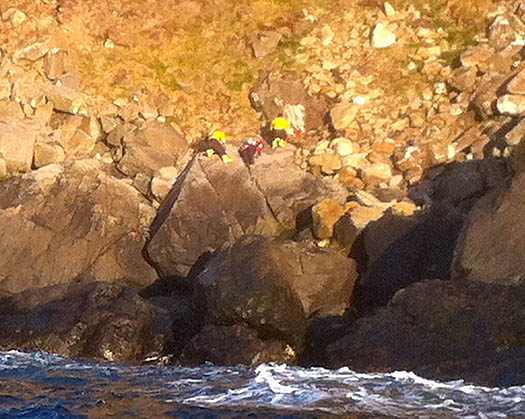
The Red Bay lifeboat crew attend the casualty
The lifeboat volunteers stayed with the casualty for two hours and assisted the Coast Guard team who secured him onto a stretcher and winched him up to the helicopter for transfer to Coleraine Hospital.
Commenting on the callout Red Bay RNLI Paddy McLaughlin said, "Under the circumstances the man was extremely lucky he managed to raise the alarm for help. No one knew where he was and the area has very poor mobile coverage. First aid is an important part of lifeboat crew training and it played a vital role in this callout. "
Second Cruiser in a Week Runs Aground in Lough Erne
#RESCUE - Four people were rescued on Lough Erne yesterday after their motor cruiser ran aground in the second such incident in a week, the Belfast Telegraph reports.
All on board were retrieved by RNLI lifeboat from the 29ft cruiser, which is believed to have stranded on rocks beyond the marked channel of the lough.
No injuries or damage to the vessel were reported, with a Northern Ireland Coastguard spokesperson describing it as "a routine rescue".
The coastguard blamed low water levels in the lough caused by lack of rainfall in Co Fermanagh.
Waterways Ireland has posted a marine notice warning boat users of the risks posed by "the extended period of unseasonal dry weather" for Ireland's inland waterways.
In a similar incident last Friday, three adults and two children were rescued from a cruiser that stranded in shallow water on the lough.
The Belfast Telegraph has more on the story HERE.
Titanic Emergency as Ill Passenger Airlifted
#TITANIC - The Titanic memorial cruise was yesterday forced to turn back just 100 miles from the southwest coast of Ireland after a passenger fell ill, BBC News reports.
The Irish Coast Guard rescue helicopter at Shannon was dispached to the MS Balmoral to retrieve BBC cameraman Tim Rex, 56, who was struck by a non-life threatening heart condition, according to the Irish Independent.
Rex, who was covering the memorial sailing for the BBC, was treated by ship's doctors before being airlifted to hospital as a precaution.
The emergency happened just hours after the ship departed Cobh, the last port of call of the ill-fated Titanic before it sank in the North Atlantic on 14 April 1912.
A spokesperson for Titanic Memorial Cruises confirmed that despite the delay, the ship is still on schedule and is expected to arrive at the Titanic wreck site as planned on Saturday.
Tennis Duo's Untold Titanic Story
#TITANIC - The Irish Times has highlighted "one of the less well-known tales of the disaster" of the Titanic, regarding two tennis champions who went on to enter that sport's hall of fame.
The story of Richard Williams and Lark Behr was told at an exhibition of sporting memorabilia in Yorkshire last month by collector Robert Fuller.
Williams, who was 21 at the time, was headed to the US Championships when the Titanic went down. He was among those rescued by the Carpathia after hours in frozen water, and fought with that ship's doctor who wanted to amputate his legs.
His persistence paid off, as just months later he was in the quarter finals of the US Open, a context he would win in 1914 and 1916, not to mention the Wimbledon doubles title in 1920 and Olympic gold in the mixed doubles in 1924.
Behr - who reportedly proposed to his fiancée on a lifeboat - also had a glittering career after the tragedy, reaching the doubles final at Wimbledon and number three in the US rankings.
Meanwhile, BBC News has posted an infographic that follows in detail the critical moments leading up to and after the Titanic struck the iceberg that sealed its doom at 11.40pm on Sunday 14 April 1912.
Corrib Anglers Donate to Rescue Boat
#ANGLING - Days after the tragic death of an angler on Lough Corrib, as previously reported on Afloat.ie, the Collinamuck Angling Club will donate €5 from every entry in the upcoming open wet fly competition on 22 April to the Corrib Mask rescue boat.
"The important work that is carried out by the volunteers of the Corrib Mask rescue boat is sometimes forgotted by us anglers," the club's Lionel Flanagan told the Galway Advertiser at the launch of this year's contest.
"We hope this small token will help the Corrib Mask rescue boat continue to provide this vital resource to Connacht anglers and visitors alike.”
#MCIB - The families of two fishermen found dead at sea off the Skerries last April may never uncover the circumstances that led to their demise. But the official report into the incident indicated that the absence of lifejackets was a significant contributing factor.
Ronan Browne (26) and David Gilsenan (41) were reported missing on the evening of 1 April after failing to return from a trip tending to lobster pots.
Their vessel, Lady Linda, was found the following morning upturned in an oil slick off Clogherhead with no sign of the crew.
It wasn't until a week later that their bodies were discovered caught in the vessel's fishing gear some five miles east of Clogherhead, as previously reported on Afloat.ie.
Post-mortem results found that both men died from drowning, with Gilsenan also showing signs of hypothermia.
With no eyewitnesses to the incident, the report by the Marine Casualty Investigation Board (MCIB) indicated a number of possible causes from eqiupment malfunction or shifting of lobster pots on deck, to the wave height and weather conditions on the day, which were reportedly deteriorating when the boat left port.
It also said that Browne and Gilsenan "were lifelong friends, both men were experienced and qualified marine engineers in the fishing vessel industry. Both men were experienced in boat handling and fishing and had worked together on many occasions."
But the report emphasised the lack of personal flotation devices (PFDs) on board, and noted that emergency equipment was stored under the deck and not easily accessible.
The MCIB's recommendations include a review of the code of practice for fishing vessels under 15m to establish "revised stability critera" and ensuring that all boats are fitted with automatic radio beacons that deploy upon capsize.
In a separate incident, lack of proper maintenance led to an unlicenced boat taking on water off Co Kerry last August.
The Claire Buoyant was carrying one crew, five passengers and 21 sheep from Beginish Island to Ventry when the vessel began to lose stability.
Skipper Eoin Firtear - who the MCIB described as having "limited sea-going experience" - and his five passengers were rescued by passenger ferry. All sheep were jettisoned overboard, with 18 eventually recovered.
The report reminded that the carriage of livestock should only be undertaken in appropriately certified vessels.
- MCIB
- Marine Casualty Investigation Board
- report
- Lady Linda
- Clogherhead
- Ronan Browne
- David Gilsenan
- lobster pots
- Fishing
- drowning
- hypothermia
- missing
- malfunction
- wave height
- Weather
- lifejackets
- Personal Flotation Devices
- PFDs
- Code of Practice
- stability
- Radio
- beacon
- maintenance
- unlicenced
- Co Kerry
- Claire Buoyant
- Sheep
- Passengers
- Beginish Island
- Ventry
- Eoin Firtear
- Skipper
- Rescue
- Livestock
Angler Dies After Lough Corrib Incident
#RESCUE - One angler has died in hospital and another was receiving emergency treatment last night after their boat got into difficulty on Lough Corrib.
According to The Irish Times, the two men were among a party of three on a boat that was struck by a wave off Annaghdown, which knocked one of them into the water.
Though he was reportedly wearing a lifejacket before he went overboard, an empty jacket was then spotted floating on the surface. One colleague entered the water to search for him but was unsuccessful.
Responding to the distress call from a nearby angling boat, the Irish Coast Guard's Shannon helicopter located the missing angler soon after arriving on scene, some 50 minutes after he entered the water.
The man was airlifted to University Hospital Galway, with the coastguard chopper returning for his colleague when he showed signs of hypothermia.
A small craft warning from Met Éireann was in effect throughout the area at the time of the incident.
The Irish Times has more on the story HERE.
Irish Tourist Drowns in Melbourne
#WATER SAFETY - A 27-year-old Irish tourist had died after drowning in Melbourne, Australia on Tuesday, the Sydney Morning Herald reports.
The tourist and a colleague, who have not yet been named, had reportedly entered the Yarra River in central Melbourne around 9pm intending to swim across. Some minutes later screams were heard from the water.
"At first I thought they were joking, I think most people did," said David Brearley, a barman at the nearby Riverland bar who had warned the pair not to attempt the crossing - but responded to the calls for help and swam out into the river.
Brearley was able to take one man to the shore where he was treated by paramedics. But the other man was lost despite the assistance of other bystanders.
His body was discovered some three hours later floating near a bridge close to the incident.
Paramedic Susie Dean praised Brearley's actions as "absolutely heroic", noting that there is "a very strong current in the Yarra".
The Sydney Morning Herald has more on the story HERE.
Cruise Lines Mandate Pre-Departure Safety Briefing for Passengers
#CRUISE LINERS - Cruise ship passengers will be given a safety briefing before leaving port under new industry rules drawn up in the wake of the Costa Concordia incident, The Guardian reports.
Three organisations representing international cruise lines have agreed that the 'muster drill' - which is currently conducted within 24 hours of setting sail as per maritime law - must now be held before departure from any port.
The move comes after reports that hundreds of passengers who had boarded the stricken vessel hours before it ran aground off the western Italian coast had not yet had any kind of safety instruction.
Muster drills, whereby passengers are shown how to put on lifejackets and directed to exits, are already common practice in the industry.
As previously reported on Afloat.ie, an Irish couple were among thousands rescued from the Costa Concordia after the incident on Friday 13 January. At least 32 people are believed to have died in the disaster, with 15 recorded passengers still missing.
The Guardian has more on the story HERE.




























